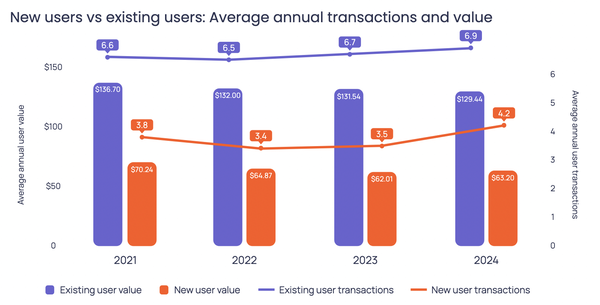
Despite growing labor costs and food shortages continuing into 2025,
QSRs still reported a 5% increase in transactions, with an average 8% increase in profits for 2024, per a new report by Par Technology. The food service tech company recently published the study based
on aggregated data from more than 30,000 QSR restaurants, which generated a total of 4.5 billion transactions and $67 billion in sales in 2024.
According to the report, those sales were
primarily driven by two key components: loyalty club member purchases and delivery.
The number of customers using loyalty guest programs for their QSR transactions increased more than 30% in
2024. In fact, non-loyalty purchases decreased by 5.3%. Actual non-loyalty sales decreased 1%, while loyalty club member sales were up 33.8%.
Delivery also continues to lead sales, generating
73% more transactions than in-store counter checks and kiosks, and 63% more transactions than mobile orders and drive-thru in 2024. Unsurprisingly, the report also found that delivery is up a whopping
383% since 2020.
advertisement
advertisement
New technology has also played a role in the sales increases. The number of orders via kiosks are up 27% since last year.
Issues negatively affecting sales
continue to be centered around labor costs and food shortages. Overall restaurant labor costs increased 6% in 2024, which was double the average increase of U.S. labor costs at 3%. Seventy-eight
percent of QSRs also reported being impacted by labor shortages. Georgia has been hit hardest, with a 28% increase in labor costs, followed by Hawaii at 11% and Wisconsin, AL, and Arkansas all
at 7%.
“Businesses must master guest needs and execution swiftly and seamlessly,” said Savneet Singh, CEO of Par Technology. “Next-generation loyalty isn't just about
points—it's about driving behavior and delivering results.”
Based on the report, the company recommends that “QSRs invest in first-party delivery services to increase
loyalty, retain customers and drive sales.” The company also advised QSRs to continue the adoption of new and evolving technology, such as kiosks and mobile ordering, “to streamline
operations and improve customer experience.” Additional recommendations include investing in employee retention programs and exploring automation to reduce dependence on labor.